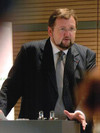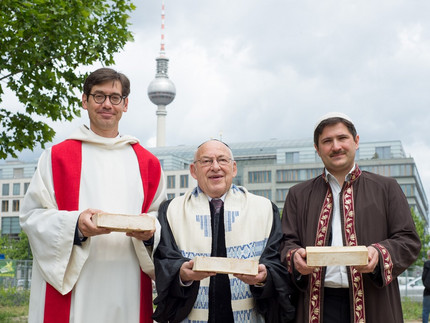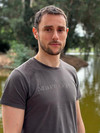Jewish religious philosophy, focus on denominations and inter-religious relations
Rabbiner Prof. Walter Homolka, PhD
Campus Am Neuen Palais / Haus 15, Raum 1.08
Tel. 0331/977-124932
Sekr. Kerstin Fischer Tel. 0331/9774312; Fax 0331/9774315
E-Mail: whomolkauuni-potsdampde
Office Hours:
Monday on appointment
The task of modern Jewish theology has been seen by Rabbi Louis Jacobs as presenting a coherent picture of what one can believe as a Jew today without evasion and while maintaining one's intellectual integrity. Modifications in religious thought have always been made - with the aim of preserving the continuity of one's own religion and at the same time creating space for further development and adaptation. Eugene Borowitz summarises this phenomenon: "Jewish theology is the product of a social hybridization".
This was basis for the formation of various Jewish denominations in the Enlightenment age and subsequently an increased exchange of Judaism with the religions of its environment. Therefore, interreligious dialogue is also in the focus of our attention.
The range of courses covers a period of two thousand years, from Philon in antiquity through Saadja Gaon and Moses ben Maimon in the Middle Ages to Moses Mendelssohn and Jewish modernity: Abraham Geiger, Leopold Zunz, Ludwig Philippson, Franz Rosenzweig, Martin Buber, Leo Baeck, Abraham Joshua Heschel, Eugene Borowitz and Neil Gillman, etc.
The meaning of “religion” for a particular community is defined to a large degree by the social constellation that shapes the task and topics of theological reflection. As society and religion interact, Jewish theology has always been shaped by its social contexts: related as an “Other” to the surrounding culture, it defined its essential self.
In these processes of cultural exchange, Judaism consciously reflected upon itself. From Biblical and Talmudic times on, Judaism had revised its forms and content in order both to safeguard continuity with its original essence and to allow for its development and accommodation in new contexts. Reform philosopher Eugene Borowitz has called Judaism the product of social cross-breeding.



